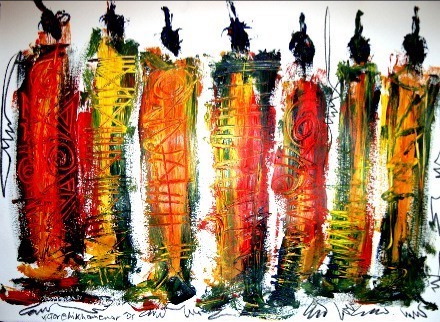|
|
| Jul/Aug 2006 • Nonfiction |
|
|
| Jul/Aug 2006 • Nonfiction |

Why would a gifted young man of twenty, someone whose most useful years were still ahead of him, choose to end his own life in a violent manner? When my friend and co-worker David stepped out to the balcony of his apartment, wrapped an American flag around his body, put the barrel of a loaded shotgun to his head, and pulled the trigger, a circle of lives and hearts was shattered. To those of us who knew him, his suicide was a gruesome outcry, a dreadful act of desperation and selfishness.
David was a student and a musician. We worked together in the music department of a bookstore, and although I was twenty-five years older than him, we became friendly with each other. He had a restless mind, enjoying the books of James Joyce, the songs of Elvis Costello, and the films of Orson Welles. I knew him to be funny, affable, and mischievous, sometimes unstable and always eccentric, but while he could be variable in mood and behavior, to me he had not seemed disposed to do what he finally did. On that February day, David canceled his intellect and his talent in the space of a grisly second, leaving an aftermath of blood, horror, anger, grief, and guilt. It was something that could not be accepted or understood.
What was the source of the darkness that infected his spirit? His life appeared to be full of promise. It seemed that David had many reasons to be happy and confident, with a positive outlook on the future, but his personality was marred by a deep element of self-hate. Although he frequently gave an impression of being fearless, I had noticed that in some ways he was unduly beholden to his family, sometimes displaying a pained willingness to appease his parents that seemed at odds with the more daring elements of his character. Was killing himself a reckless means of declaring his freedom?
As the news of his suicide spread from one person to another, tears were shed and uneasy questions were asked. What was he thinking when he made his final decision? Was he unaware of how much he was liked and valued? Or was he simply indifferent? Why did he use a gun, rather than making a more peaceful end for himself? Why did he wrap himself in a flag? Was he trying to make a political statement? I learned later that, on the weekend before David killed himself, he had talked of suicide to several of his closest friends. Being accustomed to his outlandish statements, they had not taken him seriously. Hindsight has a bitter taste.
At his funeral, which was attended by hundreds of mourners, I felt the full weight and wide extent of the tragedy. When his coffin was brought into the church, carried by a group of friends and relatives acting as pallbearers, I was overcome by the utter wrongness of what had happened. The body of my young friend, cold and silent and lifeless, was sealed in a box, waiting to be buried. As I listened to the dry prayers and empty consolations offered by the priest, I reflected on my own suicidal moods. Somehow I had been able to survive them and endure into middle age, but David had yielded to the shadows within his youthful soul, departing from his life in anguish. It was untimely and sickening. I observed his distraught family and winced at the sight of his piteous girlfriend, who sobbed and shook throughout the service. I could not condemn David for wanting to quit this unhappy world, but how could he have been so cruel to those who loved him?
That night I had a dream about David. In the dream he came up to me from behind, reaching around to clasp his arms across my midriff. As he released me, I turned and said, "David, what are you doing here?" He smiled in his usual way, but before he could reply, I awoke. I was trembling and drenched with sweat.